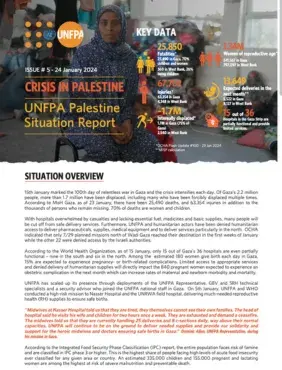15th January marked the 100th day of continuous war in Gaza and the crisis intensifies each day. Of Gaza’s 2.2 million people, more than 1.7 million have been displaced, including many who have been forcibly displaced multiple times. According to MoH Gaza, as of 23 January, there have been 25,490 deaths, and 63,354 injuries in addition to the thousands of persons who remain missing. 70% of deaths are women and children.
With hospitals overwhelmed by casualties and lacking essential fuel, medicines and basic supplies, many people will be cut off from safe delivery services. Furthermore, UNFPA and humanitarian actors have been denied humanitarian access to deliver pharmaceuticals, supplies, medical equipment and to deliver services particularly in the north. OCHA indicated that only 7/29 planned missions north of Wadi Gaza reached their destination in the first weeks of January while the other 22 were denied access by the Israeli authorities.
According to the World Health Organization, as of 15 January, only 15 out of Gaza’s 36 hospitals are even partially functional – nine in the south and six in the north. Among the estimated 180 women give birth each day in Gaza, 15% are expected to experience pregnancy- or birth-related complications. Limited access to appropriate services and denied delivery of humanitarian supplies will directly impact the 840 pregnant women expected to experience an obstetric complication in the next month which can increase rates of maternal and newborn morbidity and mortality.
UNFPA has scaled up its presence through deployments of the UNFPA Representative, GBV and SRH technical specialists and a security advisor who joined the UNFPA national staff in Gaza. On 5th January, UNFPA and WHO conducted a high-risk mission to Nasser Hospital and the UNRWA field hospital, delivering much-needed reproductive health (RH) supplies to ensure safe births.
"Midwives at Nasser Hospital told us that they are tired, they themselves cannot see their own families. The head of hospital said he visits his wife and children for two hours once a week. They are exhausted and demand a ceasefire. The midwives told us that they are currently handling 25 deliveries and 8 c-sections daily, way above their normal capacities. UNFPA will continue to be on the ground to deliver needed supplies and provide our solidarity and support for the heroic midwives and doctors ensuring safe births in Gaza." Dominic Allen, UNFPA Representative, during his mission in Gaza.
According to the Integrated Food Security Phase Classification (IPC) report, the entire population faces risk of famine and are classified in IPC phase 3 or higher. This is the highest share of people facing high levels of acute food insecurity ever classified for any given area or country. An estimated 335,000 children and 155,000 pregnant and lactating women are among the highest at risk of severe malnutrition and preventable death.


